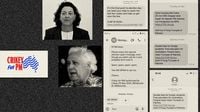As the countdown to the May 3 federal election in Australia intensifies, millions of Australians are grappling with an influx of unsolicited political text messages from Clive Palmer's newly rebranded party, the Trumpet of Patriots. The messages, which have been met with widespread frustration and outrage, promote the party's policies with abrupt and grammatically questionable language. One message reads, "Solve housing fast trains 20 minute CBD. Super for deposit 3% interest, cut immigration by 80%." Authorized by H Fong Trumpet of Patriots, these texts have sparked a significant backlash among recipients, many of whom feel their privacy has been invaded.
Social media platforms have been flooded with complaints from annoyed Australians. Users have expressed their discontent with the unsolicited messages, calling them "annoying" and "invasive." One user on X (formerly Twitter) vented, "Why am I receiving Trumpet of bloody Patriots texts? … they can shove their trumpets up their patriotic arses!" Another user lamented, "I can’t reply or block, only delete. How do I stop this junk?" The frustration is palpable, with many Australians questioning the legality and ethics of such aggressive campaigning tactics.
Despite the outcry, the Australian Electoral Commission (AEC) confirmed that the party is legally allowed to send these texts. An AEC spokesman stated, "It is legal. Political parties are exempt from the Spam Act and the Do Not Call Register." This exemption means that political messages do not require consent from the recipient, nor do they need to include an opt-out option, which has left many voters feeling helpless.
The AEC further clarified that political messages are not classified as commercial, which is why they are not subject to the same regulations that govern unsolicited advertising. According to the AEC, the only requirement is that the sender must clearly disclose who is responsible for the message. In this case, the Trumpet of Patriots' texts linked to a website where the authorization was available.
As the election draws nearer, Clive Palmer's Trumpet of Patriots continues to ramp up its advertising efforts, reportedly spending $16.3 million over six weeks—outpacing both major parties combined. The Liberals and Labor have spent $5.9 million and $5.5 million, respectively, highlighting Palmer's aggressive approach to campaigning.
Palmer's party has also focused heavily on digital platforms, with more than $4 million allocated to YouTube ads, surpassing the Coalition's $2.3 million and Labor's $2 million. This significant investment in digital media reflects a broader trend in political advertising, as parties increasingly seek to engage younger voters through platforms where they spend the most time.
Interestingly, the Trumpet of Patriots' messaging has not been without controversy. The party's advertisements have faced criticism for being misleading, particularly a YouTube video that questions climate change using outdated footage. Additionally, a newspaper advert asserting "there are only two genders—male and female" was removed from the online edition of the Newcastle Herald after inciting backlash.
Palmer has positioned his party as a voice for those disillusioned with the major parties, claiming that one in three Australians voted for minor parties and independents in the last election. He has pledged to field over a hundred candidates across the Senate and House of Representatives, emphasizing a commitment to addressing issues like wasteful government spending, immigration cuts, and housing affordability.
One of the party's candidates, Ganesh Loke, who is contesting the federal electorate of Parramatta, reflects this sentiment. Loke, who immigrated to Australia from India in 1999, believes that the current political landscape is ripe for change. He stated, "People are fed up with the major parties. They want alternatives." Loke's priorities include improving access to healthcare, reducing immigration, and lowering the cost of living.
Despite the controversies surrounding the party's advertising and messaging strategies, Loke remains steadfast in his support for Palmer, stating, "There are a lot of misconceptions. I would like to say Clive is a really good person. I have met Clive." Loke also emphasized that while the party's name references former U.S. President Donald Trump, their policies differ significantly.
Political analysts have noted that Palmer's approach, characterized by saturation advertising and aggressive messaging, may do more harm than good. Toby Ralph, a political strategist, remarked that such tactics often lead to voter annoyance rather than persuasion. He stated, "When Clive Palmer-style carpet bombing happens, it does more harm than good. His results make that unequivocal." This sentiment resonates with many Australians who feel overwhelmed by the barrage of unsolicited messages.
As the election date approaches, the debate over the legality and ethics of political text messaging continues to unfold. Many voters are left wondering how their personal information was obtained and why they cannot opt out of these intrusive communications. The lack of transparency surrounding the source of phone numbers used in political campaigning has raised concerns about privacy and data protection.
In a landscape where political advertising is becoming increasingly aggressive, the Trumpet of Patriots' approach serves as a case study in the evolving dynamics of electoral campaigning. As parties adapt to the digital age, the strategies employed will likely continue to spark debate and scrutiny.
With the federal election just days away, Australians are grappling with the implications of unsolicited political messaging and what it means for their democratic process. As they prepare to cast their votes, the effectiveness of these tactics—and the future of political communication in Australia—hangs in the balance.





